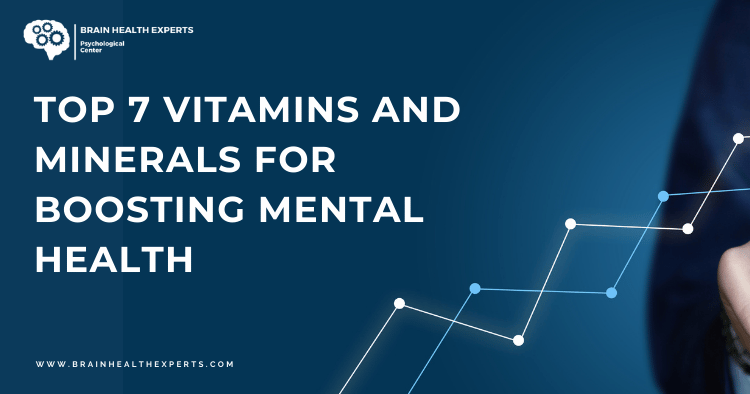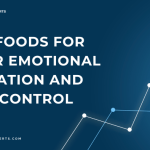Table of Contents
- Introduction
- Vitamin B Complex
- Vitamin D
- Omega-3 Fatty Acids
- Magnesium
- Zinc
- Iron
- Folic Acid
- Conclusion
- FAQs
Introduction
Mental health is a crucial aspect of overall well-being, and the role of vitamins and minerals in supporting cognitive function and emotional balance cannot be overstated. Just like our bodies require nutrients to function optimally, our minds need specific vitamins and minerals to thrive. In this article, we will explore the top seven vitamins and minerals that can help boost your mental health, offering insights into their functions and how to incorporate them into your diet.
“Your body is a temple, but only if you treat it as one.” – Astrid Alauda
Vitamin B Complex
The B vitamins, a group of eight essential nutrients, play a pivotal role in brain health. These include B1 (thiamine), B2 (riboflavin), B3 (niacin), B5 (pantothenic acid), B6 (pyridoxine), B7 (biotin), B9 (folate), and B12 (cobalamin).
Benefits:
- Energy Production: B vitamins are critical for converting food into energy, which is vital for maintaining mental alertness.
- Mood Regulation: Vitamins B6, B9, and B12 are involved in the synthesis of neurotransmitters such as serotonin and dopamine, which regulate mood and can help alleviate symptoms of anxiety and depression. For more tips on improving mental health through positive thinking techniques, check out 10 Positive Thinking Techniques to Reduce Stress.
Sources:
Whole grains, eggs, dairy, legumes, and leafy greens are excellent sources of B vitamins.
Visual Element:
| B Vitamin | Function | Food Sources |
|---|---|---|
| B1 | Energy production | Whole grains, pork |
| B2 | Antioxidant support | Eggs, dairy |
| B3 | DNA repair | Meat, fish, nuts |
| B6 | Neurotransmitter synthesis | Fish, potatoes, chickpeas |
| B9 | Cell division | Leafy greens, legumes |
| B12 | Nerve function | Meat, dairy, fortified foods |
Vitamin D
Vitamin D, often referred to as the “sunshine vitamin,” is not only essential for bone health but also plays a significant role in mental well-being.
Benefits:
- Mood Enhancement: Research indicates that vitamin D can help alleviate symptoms of depression. It is thought to increase the production of serotonin, a neurotransmitter that stabilizes mood. For insights on how positive thinking can influence emotional well-being, see 10 Ways Positive Thinking Boosts Emotional Well-Being.
- Cognitive Function: Adequate levels of vitamin D are vital for overall cognitive functioning and have been linked to a lower risk of developing neurodegenerative diseases.
Sources:
- Sunlight exposure, fatty fish, fortified milk, and egg yolks are rich in vitamin D.
“Vitamin D is a key ingredient in the recipe for mental wellness.”
Omega-3 Fatty Acids
While technically a nutrient rather than a vitamin or mineral, omega-3 fatty acids are crucial for brain health.
Benefits:
- Cognitive Function: Omega-3s, particularly EPA and DHA, are vital for maintaining the structure of brain cells, enhancing cognitive function.
- Mood Regulation: Numerous studies have shown a link between omega-3 intake and reduced symptoms of depression and anxiety. To explore how positive thinking can transform your daily life, refer to 10 Ways Positive Thinking Transforms Your Daily Life.
Sources:
- Fatty fish (like salmon and mackerel), walnuts, flaxseeds, and chia seeds are excellent sources of omega-3 fatty acids.
Magnesium
Magnesium is a mineral that plays a crucial role in numerous biochemical reactions in the body, including those affecting mental health.
Benefits:
- Stress Reduction: Magnesium can help regulate neurotransmitters that send messages throughout the brain and body, potentially reducing feelings of stress and anxiety.
- Sleep Quality: Adequate magnesium levels can improve sleep quality, which is vital for mental health. Discover more about sleep’s impact on mental health in Top 7 Ways Sleep Impacts Your Mental Health Today.
Sources:
- Leafy greens, nuts, seeds, and whole grains are rich in magnesium.
“Magnesium: the mineral that keeps your mind and body in balance.”
Zinc
Zinc is an essential trace mineral that plays a significant role in brain health.
Benefits:
- Mood and Anxiety: Research suggests that zinc deficiency may be linked to mood disorders and anxiety. Supplementing with zinc can help improve mood and cognitive function.
- Neurotransmitter Regulation: Zinc is involved in regulating neurotransmitters, ensuring a healthy communication pathway in the brain.
Sources:
- Meat, shellfish, legumes, seeds, and nuts are excellent sources of zinc.
Iron
Iron is crucial for the production of hemoglobin, which carries oxygen in the blood, and is vital for brain function.
Benefits:
- Cognitive Function: Adequate iron levels are essential for maintaining cognitive function and preventing fatigue, which can adversely affect mental health.
- Mood Stability: Iron deficiency has been linked to symptoms of depression and cognitive impairment. For more on how to combat anxiety, see 10 Effective Techniques to Manage Anxiety in Daily Life.
Sources:
- Red meat, poultry, lentils, beans, and fortified cereals are rich in iron.
“An iron-rich diet is more than just a boost for your body; it’s a lifeline for your mind.”
Folic Acid
Folic acid, or vitamin B9, is particularly important for mental health, especially during periods of rapid growth, such as during pregnancy.
Benefits:
- Mood Improvement: Folic acid is essential for the production of neurotransmitters that regulate mood. Low levels of folate have been associated with an increased risk of depression.
- Cognitive Health: Adequate folate levels are associated with better cognitive function and lower risk of cognitive decline in older adults.
Sources:
- Leafy greens, legumes, seeds, and fortified cereals are excellent sources of folic acid.
Conclusion
Incorporating these vitamins and minerals into your diet can significantly enhance your mental health. A balanced diet rich in whole foods, fruits, vegetables, and healthy fats will ensure you get an adequate supply of these crucial nutrients. Remember, while diet plays a vital role, mental health is multifaceted, and it’s always best to consult with a healthcare provider for personalized advice.
“Healthy mind, healthy body: it all starts with what you consume.”
FAQs
1. Can I get enough vitamins and minerals from my diet?
Yes! A varied and balanced diet can provide most of the nutrients your body needs. However, some individuals may require supplements, especially if they have dietary restrictions.
2. How do I know if I’m deficient in vitamins or minerals?
Symptoms of deficiencies can include fatigue, mood swings, and cognitive issues. A blood test conducted by a healthcare professional can accurately determine your levels.
3. Are there any risks associated with taking supplements?
While many vitamins and minerals are essential for health, excessive intake can lead to toxicity. Always consult with a healthcare provider before starting any supplement regimen.
4. Can lifestyle changes help improve my mental health?
Absolutely! Regular physical activity, sufficient sleep, and stress management techniques can all significantly improve mental well-being alongside proper nutrition.
For further reading on the importance of vitamins and minerals for mental health, check out Healthline and Psychology Today.
Feel free to share your thoughts or experiences regarding vitamins and mental health in the comments below!





